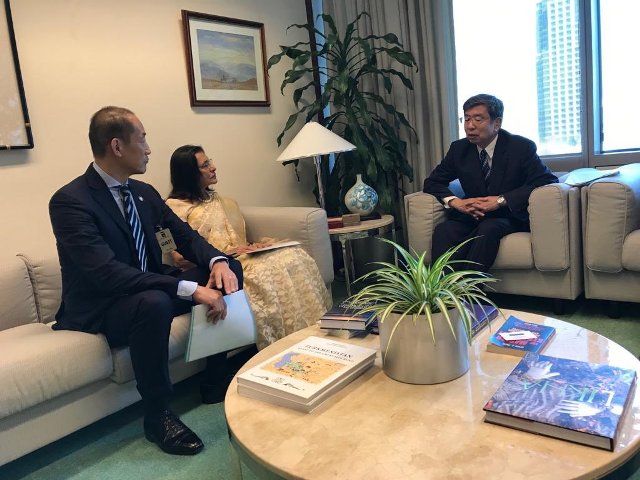ADB looks forward to work with WHO to achieve universal health coverage: President Nakao
“ADB’s new long-term strategic framework Strategy 2030 and its aspirations for Asia and the Pacific are fully aligned with the Sustainable Development Goals and the global call for UHC,” said Mr Nakao.

- Country:
- Philippines
Asian Development Bank (ADB) President Mr. Takehiko Nakao, newly appointed Regional Director of the World Health Organization (WHO) Western Pacific Regional Office Dr. Takeshi Kasai, and Regional Director of the WHO South East Asia Regional Office Dr. Poonam Khetrapal Singh met at ADB headquarters to discuss ways to strengthen collaboration in supporting countries’ efforts to achieve universal health coverage (UHC) and better health for their populations.
As countries prosper, expectations of better health service infrastructure and healthier living conditions rise. Achieving better health outcomes demands sufficient resources as well as innovative approaches to manage health care in new ways, more effectively, with better quality, and for lower cost.
“ADB’s new long-term strategic framework Strategy 2030 and its aspirations for Asia and the Pacific are fully aligned with the Sustainable Development Goals and the global call for UHC,” said Mr Nakao. “We look forward to working together with WHO to help achieve UHC, increase health security against pandemics through surveillance and laboratory support, and improve urban health, elderly care, and climate change impacts on health in Asia and the Pacific.”
ADB expects to scale up its investments in health projects and health components of multi-sectoral projects that would enable Asia and the Pacific to achieve and maintain UHC. These investments may be informed and reinforced by WHO technical advice and support, coordinated under the ADB–WHO Memorandum of Understanding (MOU) signed in September 2018.
The MOU calls for ADB and WHO to conduct joint policy analysis and research, collaborate on the production and sharing of knowledge products through seminars and conferences, and strengthen international and regional networks, among others.
“The collaboration between ADB and WHO could work to improve the health and well-being of people, particularly through the identified areas of cooperation such as supporting universal health coverage, including affordability and accessibility of medical products, enhancing human resources for health, improving primary health care infrastructure, and strengthening disaster preparedness and response,” said Dr. Singh. “We look forward to the development of results-oriented action plans to implement the ADB–WHO MOU.”
Dr. Kasai added: “The signs of several impending crises are plain to see: Populations are getting older and non-communicable diseases are on the rise; the next pandemic could strike at any time; air pollution and climate change are already taking a huge toll on health; and too many people in this region still cannot access affordable, high-quality health care. These are key challenges on which we’ll work with ADB and focus our support to countries over the coming 5 years.”
In 2018, ADB loan and grant commitments in the health sector totalled $516 million for 13 projects, the highest numbers for health since 2010. The projects included support for enhancing provincial-level health services in Papua New Guinea; the integration of maternal and child health services in Tajikistan; strengthening of health systems in Bhutan, Lao People’s Democratic Republic, Mongolia, and Sri Lanka; and investments in private hospitals that expand access to low-cost quality maternity care in Indonesia.
In addition, ADB is providing technical assistance to help prepare national health strategies and build universal health care systems. ADB has been co-organizing conferences to promote the use of digital data in the health sector.
In 2019, ADB expects commitments of more than $700 million for health projects. These would include strengthening local health systems in Viet Nam; establishing digital health systems in Tonga; piloting elderly care interventions in the People’s Republic of China, and supporting health financing policy reforms in Armenia.
ALSO READ
Doctors Unveil Indoor Air's Impact on Health at Delhi Meet
Horizon1000: AI Revolutionizing Health Systems in Africa
Revolutionizing India's Health System: A Citizen-Centric Approach
Andhra Pradesh: The Surging Hub for Global Investments and Innovation
Zakir Khan Announces Long Hiatus From Live Tours Amid Health Concerns










